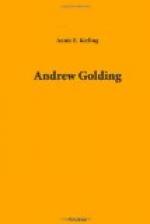When we got into the hall we saw Andrew sitting there and talking with the stranger, who was now clothed like any other man. His face had been bruised and his hair torn by the violence of the people; but, for all these disfigurements, I, looking earnestly at him, could see he was the very one the sight of whose ill-usage had so moved Andrew on our journey; there was the same composed look, and the same strange inward light in his eye.
He rose when he saw Aunt Golding come in, saluting her with the words, ‘Peace be to thee!’ on which she, gravely smiling, said,—
’You did not bring peace with you to our place of worship, sir; but I trust no one will break your peace in my house, where you are welcome to rest and refresh you this day.’
‘No man can break my peace,’ said he, ’my soul being ever at rest in the Holy City, the New Jerusalem.’
‘That’s a good resting-place indeed,’ said our aunt. ’Will you tell me by what name I am to call you while you stay here? I think no one in our village knows who you are.’
‘Not every one can know my name, but they that have the Light,’ said the man; ‘and the world can never know it.’
’But sure, man, you have a name of your own by which the world does know you,’ said our aunt a little impatiently.
‘I wish not to deny it,’ he replied; ’therefore fret not thyself, good friend,—my worldly name is James Westrop. And I will tell thee what thou askest not, that my errand hither is to this young man, Andrew Golding. I have now told him my message, so I am free to depart; and if thou likest not of my talk or my ways, I refuse not to leave thy house and protection this hour.’
‘But I will not have you go,’ said she, ’till you are refreshed and rested. And, in good time, here comes the Vicar, whom I have desired to sup with us and to reason with you. You will not refuse his company? He scorns not yours.’
‘I will not refuse it,’ said Westrop gravely; and Mr. Truelocke coming in at that moment with Harry, we all went presently to table.
I marvelled greatly during the meal at Mr. Truelocke’s courtesy, so kindly did he speak to the Quaker; and he strove to excuse to him the mad behaviour of the people, ascribing it to their regard for their ancient pastor, now about to leave them. ‘I pray you,’ he said, ’to pardon them for my sake.’
‘Friend,’ said James Westrop, ’I had pardoned them before they offended. But thou art deceived if thou thinkest it was love to thee which moved them. They could not endure my word, because their own spirits were foul. My word was to them as the shining of a candle into a dark, dirty place, and the sight of their foulness made them mad against me. But in thee I perceive purity of intention; and I will gladly reason with thee of the things of the Spirit, according to this good woman’s desire.’




